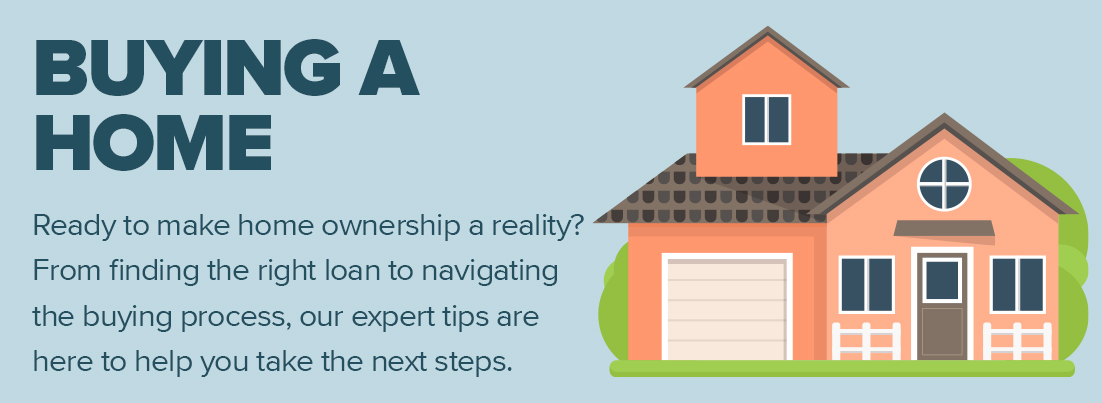
Learn The Smart Way to Buy Your Dream Home
Check out our tips and strategies for buying and owning a car, with articles to guide you through every step—from budgeting to maintenance—so you can hit the road with confidence.
Thinking of buying a house? Here’s what you need to know before applying for a mortgage.
Buying a home is one of the biggest financial decisions you’ll make. Let’s look at some steps that can make the experience easier and boost your chances of approval.
How Your Credit Score Effects Your Home Loan
Get to know what a credit score really is, why it matters, and how it affects your finances. Learn simple tips for building a good score without stressing over perfection.
Understanding What Factors Affect Your Mortgage Rate
Everybody wants the best rate on their mortgage, but few people know exactly what goes into determining that rate. Here’s a breakdown of the top influences on your mortgage rate.
VIDEO RESOURCES
Buying a home is a major decision, whether it’s your first or an upgrade. Nuvision is here to guide you with resources on everything from budgeting to finding the best financing options for you.
Buying A Home? Watch This First!
Buying a home is a big decision, whether it’s your first or an upgrade. Nuvision is here to help you make the best choice with resources and guidance on everything from budgeting to finding the right financing options.
Get the Best Deal on Your Home Loan with Our Mortgage Calculator
Our Mortgage Calculator helps you find the smartest way to finance your home. Take control of your budget and see how small adjustments can lead to big savings over the life of your loan.
Use this calculator to generate an estimated amortization schedule for your current mortgage. Quickly see how much interest you could pay and your estimated principal balances. You can even determine the impact of any principal prepayments! Press the "Report" button for a full yearly or monthly amortization schedule.
Information and interactive calculators are made available to you as self-help tools for your independent use and are not intended to provide investment advice. We cannot and do not guarantee their applicability or accuracy in regards to your individual circumstances. All examples are hypothetical and are for illustrative purposes. We encourage you to seek personalized advice from qualified professionals regarding all personal finance issues.
Buying A Home FAQS
While the traditional down payment has been around 20% of the home’s price, today’s lending options provide more flexibility, allowing many buyers to make smaller down payments. If you're going with a conventional loan, you might qualify for down payments as low as 3%, which is especially helpful for first-time buyers or those who haven’t had time to save for a larger down payment. There are also specialized loan options, like VA loans for qualified veterans, which may not require a down payment at all. FHA loans are another popular option, often allowing down payments as low as 3.5%.
That said, putting down more than the minimum has advantages. A larger down payment reduces the loan amount and can help you secure a lower interest rate, as lenders see you as less of a risk when you invest more upfront. It also gives you more immediate equity in the home and can eliminate the need for private mortgage insurance (PMI). PMI is an extra cost that’s usually required if your down payment is below 20%. While it protects the lender in case you default on the loan, it’s an added monthly expense for you. By making a larger down payment, you avoid PMI and reduce your monthly costs, making homeownership more affordable over the long run.
So, while it’s possible to buy a home with a small down payment, consider your long-term financial goals. A higher down payment can save you significantly over the life of the loan and lower your monthly payments, helping you build equity faster.
Your credit score is a big factor in determining your interest rate. A higher score generally means a lower rate, saving you money over the life of the loan. Lenders view high credit scores as an indication that you’re financially responsible and less risky to lend to. If your credit needs work, it can be beneficial to improve it before applying, as even a slight rate reduction can lead to significant long-term savings.
Your monthly mortgage payment usually covers four main parts: principal, interest, taxes, and insurance—often called PITI. The principal is the amount you borrowed for the home, while interest is what you pay the lender for borrowing that money. Taxes refer to property taxes, which are typically collected by your lender and sent to the local government. Insurance includes homeowners insurance, which protects both you and the lender if anything happens to the home. If your down payment was less than 20%, you might also have private mortgage insurance (PMI) added to your payment, which lenders require to protect themselves in case payments stop.
While the 28/36 rule is a helpful guide, affordability is personal, and it’s essential to look beyond just the lender’s calculations. You’ll want to factor in other expenses unique to your lifestyle, such as savings goals, retirement contributions, and unexpected costs like home maintenance or repairs. A lender might approve you for a higher loan amount than you’re actually comfortable with, so it’s wise to map out your own budget, considering your savings, travel, and entertainment expenses. Ultimately, the goal is to ensure you can comfortably afford the payments without stretching yourself too thin each month.
To get a better sense of what’s realistic for you, check our calculator above to see what your monthly payments might look like. You can also consult with a Nuvision Credit Union expert for personalized advice on finding the right loan amount for your budget. This way, you’re not only prepared to qualify for a loan but to enjoy your home without financial stress.
PMI is insurance that protects the lender in case you default on your loan. It’s generally required if you make a down payment of less than 20% on a conventional loan. The cost of PMI is typically added to your monthly mortgage payment. The good news is that once you reach 20% equity in your home, you can often request to cancel PMI, which will lower your monthly payments.






